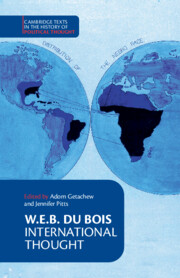Book contents
- W.E.B. Du Bois: International Thought
- Cambridge Texts In The History Of Political Thought
- W.E.B. Du Bois: International Thought
- Copyright page
- Contents
- Figures
- Acknowledgments
- Note on the Text
- Democracy and Empire
- Select Chronology of William Edward Burghardt Du Bois
- Book part
- 1 The Present Outlook for the Dark Races of Mankind (1900)
- 2 To the Nations of the World (1900)
- 3 The African Roots of War (1915)
- 4 Of the Culture of White Folk (1917)
- 5 Letter from W. E. B. Du Bois to President Woodrow Wilson (1918)
- 6 To the World (Manifesto of the Second Pan-African Congress) (1921)
- 7 Worlds of Color (1925)
- 8 Liberia and Rubber (1925)
- 9 Liberia, the League and the United States (1933)
- 10 Where Do We Go from Here?
- 11 Inter-Racial Implications of the Ethiopian Crisis: A Negro View (1935)
- 12 The Clash of Colour: Indians and American Negroes (1936)
- 13 The Union of Colour (1936)
- 14 What Japan Has Done (1937)
- 15 Black Africa Tomorrow (1938)
- 16 The Realities in Africa: European Profit or Negro Development? (1943)
- 17 Prospect of a World without Race Conflict (1944)
- 18 Colonies and Moral Responsibility (1946)
- 19 A Cup of Cocoa and Chocolate Drops (1946)
- 20 An Appeal to the World: A Statement of Denial of Human Rights to Minorities
- 21 Colonies as Cause of War: Address to the World Peace Congress, Paris (1949)
- 22 On the West Indies: Address of Dr. W. E. B. Du Bois at the St. Thomas Chamber of Commerce (1952)
- 23 To the World Peace Council, Budapest (1953)
- 24 Colonialism and the Russian Revolution (1956)
- Index
3 - The African Roots of War (1915)
Published online by Cambridge University Press: 10 November 2022
- W.E.B. Du Bois: International Thought
- Cambridge Texts In The History Of Political Thought
- W.E.B. Du Bois: International Thought
- Copyright page
- Contents
- Figures
- Acknowledgments
- Note on the Text
- Democracy and Empire
- Select Chronology of William Edward Burghardt Du Bois
- Book part
- 1 The Present Outlook for the Dark Races of Mankind (1900)
- 2 To the Nations of the World (1900)
- 3 The African Roots of War (1915)
- 4 Of the Culture of White Folk (1917)
- 5 Letter from W. E. B. Du Bois to President Woodrow Wilson (1918)
- 6 To the World (Manifesto of the Second Pan-African Congress) (1921)
- 7 Worlds of Color (1925)
- 8 Liberia and Rubber (1925)
- 9 Liberia, the League and the United States (1933)
- 10 Where Do We Go from Here?
- 11 Inter-Racial Implications of the Ethiopian Crisis: A Negro View (1935)
- 12 The Clash of Colour: Indians and American Negroes (1936)
- 13 The Union of Colour (1936)
- 14 What Japan Has Done (1937)
- 15 Black Africa Tomorrow (1938)
- 16 The Realities in Africa: European Profit or Negro Development? (1943)
- 17 Prospect of a World without Race Conflict (1944)
- 18 Colonies and Moral Responsibility (1946)
- 19 A Cup of Cocoa and Chocolate Drops (1946)
- 20 An Appeal to the World: A Statement of Denial of Human Rights to Minorities
- 21 Colonies as Cause of War: Address to the World Peace Congress, Paris (1949)
- 22 On the West Indies: Address of Dr. W. E. B. Du Bois at the St. Thomas Chamber of Commerce (1952)
- 23 To the World Peace Council, Budapest (1953)
- 24 Colonialism and the Russian Revolution (1956)
- Index
Summary
This 1915 essay, portions of which appeared in revised form in Du Bois’s 1920 book Darkwater, identifies imperial rivalry as the root cause of the First World War. It asks why democracies had embraced imperial expansion and elaborates a new concept, the paradoxical “democratic despotism.” The new age of imperialism was distinctive in that the democratic nation, rather than the merchant or monopoly company, had become the agent of imperialism. The expansion of European empires throughout Africa had in fact been essential to the development of democracy in nineteenth century Europe, easing class conflict between workers and capitalists through the sharing of imperial spoils, wealth acquired through the subjection of “the darker nations of the world.” This global color line was incomplete, because Japan and China showed signs of independence from white hegemony. But pacifists and humanitarians must recognize that until the democratic ideal was extended to non-white peoples, not only would the majority of humanity suffer injustice but also war would continually threaten Europe and the world.
- Type
- Chapter
- Information
- W. E. B. Du Bois: International Thought , pp. 22 - 35Publisher: Cambridge University PressPrint publication year: 2022

